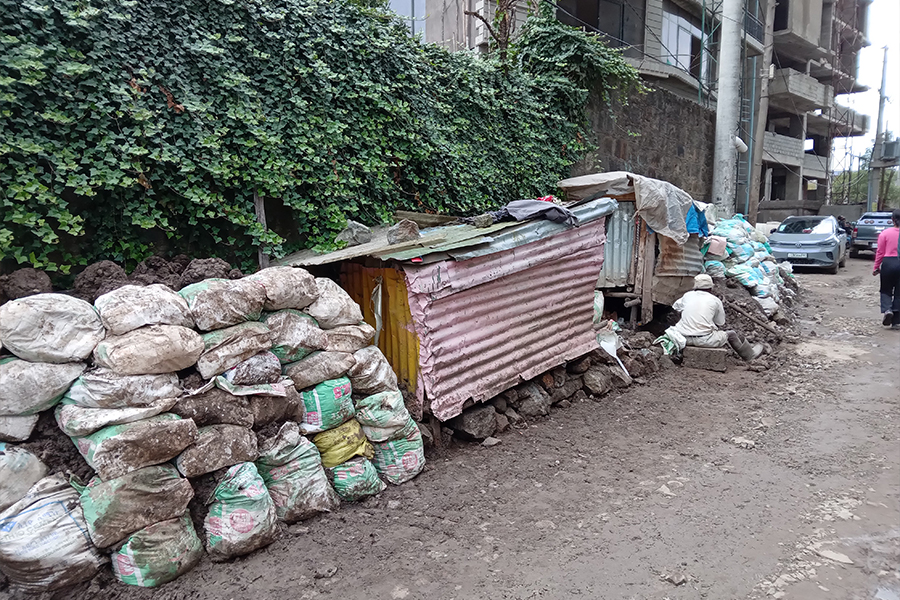
Trade officials have added six commodities under the contract farming scheme, hoping to fight what they say is “rampant” under-invoicing and hoarding practices. Officials hope to boost export revenues through the reclassification.
The addition includes niger seeds, groundnut and chickpeas. Gemechis Melaku, executive director of export trade at the Ministry of Trade & Regional Integration (MoTRI), believes the decision will encourage farmers to expand a demand-driven farming system.
“It’ll help the government control under-invoicing and hoarding,” he toldFortune.
A few commodities, such as oilseeds, sugarcane, and barley, were eligible for contract farming. However, trade officials suspended contract farming for sesame (part of the scheme since 2019) last year, alleging widespread illicit activities. Authorities claimed to have seized a 60,000tns of cash crops stashed in warehouses belonging to 105 exporters, who had to ship them in a month. The Trade Ministry regulates the domestic trade and export of sesame and pulses.
The oilseeds and pulses exports generated 477 million dollars last year. Trade Minister Gebremeskel Chala and his deputies have forecasted revenues of close to 600 million dollars this year.
Sourcing export commodities from the domestic market has challenged agro-processing industries and exporters. They are forced to buy the commodities at higher prices or default on their contracts.
Incorporated seven years ago with a registered capital of four million Birr, Hamam Commercial & Industrial Plc has been exporting cereals and oilseeds. It sources most export items from farmers in the Amhara and Gambela regional states.
“We buy from farmers at prices higher than those offered at the Ethiopian Commodity Exchange,” said Abebaw Tadesse, the general manager.
Hamam Commercial earned seven million dollars last year, shipping 7,000tns to China, Japan, and Europe.
Other exporters have chosen to cut down shipments to get by.
Ademe Mekonnen Export Plc annually ships up to 1,500tns of cereal and oilseeds to Israel and China. Established in 2009 with four million Birr capital, the company used to source cash crops from the Ethiopian Commodity Exchange (ECX). However, it has been unable to receive sufficient quantities, disclosed Mehatemie Memhir, export manager.
Shortages in the domestic market have reduced the company’s export volumes by more than a quarter. Last year, it shipped 1,500tns of cereals and oilseeds, generating nearly three million dollars. Mehatemie says the company stopped exporting niger seed two years ago.
Niger seed production has been in decline in recent years. Last year saw 210,000tns harvested, down by a quarter from the previous year’s output.
Mehetemie’s firm had previously attempted to source 50,000qtl of cash crops through contracts with farmers in the Benishangul-Gumuz Regional State. He blames a few exporters who convinced farmers to sell their products, demanding higher prices.
“The higher prices these exporters offer motivates farmers to breach their contracts,” said Mehatemie.
He observes that although lower administrative levels in regional states authenticate contracts between farmers and agro-processors, enforcing the contracts remains a challenge. Federal authorities responded last week, imposing floor and ceiling prices for oilseeds and pulses traded through the ECX platform.
Assefa Senbeta is a plant scientist who worked for the Ethiopian Seeds Enterprise (ESE). He has observed transactions carried out through contract farming but without a legally bidding arrangement.
“Unless the scheme is recognised through legislation, its disadvantage outweighs the benefits,” he told Fortune.
The Council of Ministers endorsed a long-awaited bill governing contract farming before sending it to legislators two weeks ago. It aspires to enforce contracts, formalise the scheme, and allow agro-processing industries to source raw materials from millions of small-scale farmers.
Abebaw and Mehatemie hope the new law will address some of their problems. To be tabled to lawmakers next month, the bill proposes to make unlawful contract terminations a criminal offence. Contract disputes are settled in civil courts.
Assefa says incorporating specifics in the law is key to making the most out of the scheme.
Dereje Abebe, team leader for out-growers and contract farming at the Ministry of Agriculture, disclosed a directive outlining the responsibilities and rights of parties involved in contracting farming has already been completed.
“It’ll be implemented after Parliament ratifies the proclamation,” he toldFortune.
His office is also preparing a guideline outlining conditions for the production and marketing of farm products.
PUBLISHED ON
Aug 27,2022 [ VOL
23 , NO
1165]

Obituary | May 31,2025

Fortune News | Apr 13,2019

Sponsored Contents | Aug 22,2022

Fortune News | Jul 01,2023

Fortune News | Jan 05,2019

Fortune News | May 29,2023

In-Picture | Jul 28,2024

Radar | Aug 25,2024

Fortune News | Sep 18,2022

Fortune News | Mar 28,2020

Dec 22 , 2024 . By TIZITA SHEWAFERAW
Charged with transforming colossal state-owned enterprises into modern and competitiv...

Aug 18 , 2024 . By AKSAH ITALO
Although predictable Yonas Zerihun's job in the ride-hailing service is not immune to...

Jul 28 , 2024 . By TIZITA SHEWAFERAW
Unhabitual, perhaps too many, Samuel Gebreyohannes, 38, used to occasionally enjoy a couple of beers at breakfast. However, he recently swit...

Jul 13 , 2024 . By AKSAH ITALO
Investors who rely on tractors, trucks, and field vehicles for commuting, transporting commodities, and f...

Jun 28 , 2025
Meseret Damtie, the assertive auditor general, has never been shy about naming names...

Jun 21 , 2025
A well-worn adage says, “Budget is not destiny, but it is direction.” Examining t...

Jun 14 , 2025
Yet again, the Horn of Africa is bracing for trouble. A region already frayed by wars...

Jun 7 , 2025
Few promises shine brighter in Addis Abeba than the pledge of a roof for every family...